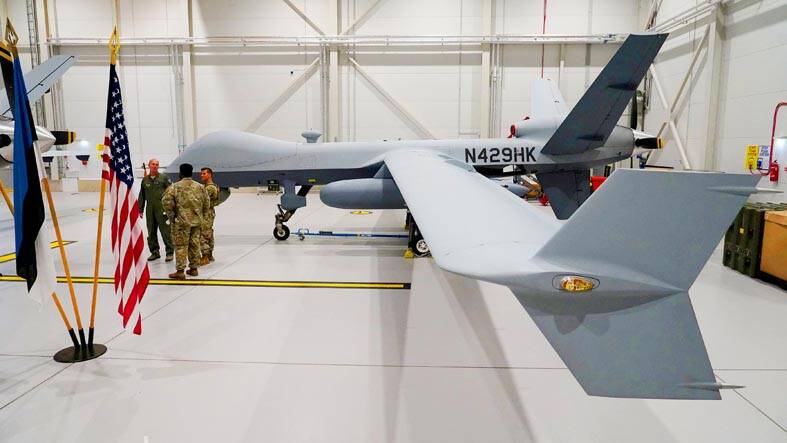A Russian fighter jet on Tuesday dumped fuel on a US drone over the Black Sea and then collided with it, causing the drone to crash, the US military said, calling the maneuver “reckless.”
The US European Command said that two Russian Su-27 fighters intercepted the MQ-9 Reaper over international waters and one clipped its propeller.
“Several times before the collision, the Su-27s dumped fuel on and flew in front of the MQ-9 in a reckless, environmentally unsound and unprofessional manner,” it said.

Photo: Reuters
Moscow denied causing the crash of the drone, which the Pentagon said was on a routine intelligence, surveillance and reconnaissance mission.
“As a result of a sharp maneuver ... the MQ-9 unmanned aerial vehicle [UAV] entered an uncontrolled flight with loss of altitude and collided with the surface of the water,” the Russian Ministry of Defense said, adding that the two Russian jets had no contact with the US aircraft and did not use their weapons.
The US Department of State said that it had summoned Russian Ambassador to the US Anatoly Antonov to protest.
“We assume that the United States will refrain from further speculation in the media and stop flights near Russian borders,” Antonov wrote on Telegram later. “We consider any action with the use of US weaponry as openly hostile.”
“Obviously we refute the Russians’ denial,” US National Security Council spokesman John Kirby said, adding that the US is trying to prevent the fallen drone from getting into the wrong hands.
Meanwhile, Kyiv yesterday accused Russian President Vladimir Putin of trying to widen the conflict in Ukraine.
“The incident with the American MQ-9 Reaper UAV — provoked by Russia over the Black Sea — is Putin’s way of signaling his readiness to expand the conflict to involve other parties,” Ukrainian National Security and Defense Council Secretary Oleksiy Danilov wrote on social media. “The purpose of this all-in tactic is to always be raising the stakes.”

CALL FOR SUPPORT: President William Lai called on lawmakers across party lines to ensure the livelihood of Taiwanese and that national security is protected President William Lai (賴清德) yesterday called for bipartisan support for Taiwan’s investment in self-defense capabilities at the christening and launch of two coast guard vessels at CSBC Corp, Taiwan’s (台灣國際造船) shipyard in Kaohsiung. The Taipei (台北) is the fourth and final ship of the Chiayi-class offshore patrol vessels, and the Siraya (西拉雅) is the Coast Guard Administration’s (CGA) first-ever ocean patrol vessel, the government said. The Taipei is the fourth and final ship of the Chiayi-class offshore patrol vessels with a displacement of about 4,000 tonnes, Lai said. This ship class was ordered as a result of former president Tsai Ing-wen’s (蔡英文) 2018

UKRAINE, NVIDIA: The US leader said the subject of Russia’s war had come up ‘very strongly,’ while Jenson Huang was hoping that the conversation was good Chinese President Xi Jinping (習近平) and US President Donald Trump had differing takes following their meeting in Busan, South Korea, yesterday. Xi said that the two sides should complete follow-up work as soon as possible to deliver tangible results that would provide “peace of mind” to China, the US and the rest of the world, while Trump hailed the “great success” of the talks. The two discussed trade, including a deal to reduce tariffs slapped on China for its role in the fentanyl trade, as well as cooperation in ending the war in Ukraine, among other issues, but they did not mention

HOTEL HIRING: An official said that hoteliers could begin hiring migrant workers next year, but must adhere to a rule requiring a NT$2,000 salary hike for Taiwanese The government is to allow the hospitality industry to recruit mid-level migrant workers for housekeeping and three other lines of work after the Executive Yuan yesterday approved a proposal by the Ministry of Labor. A shortage of workers at hotels and accommodation facilities was discussed at a meeting of the legislature’s Transportation Committee. A 2023 survey conducted by the Tourism Administration found that Taiwan’s lodging industry was short of about 6,600 housekeeping and cleaning workers, the agency said in a report to the committee. The shortage of workers in the industry is being studied, the report said. Hotel and Lodging Division Deputy Director Cheng

‘SECRETS’: While saying China would not attack during his presidency, Donald Trump declined to say how Washington would respond if Beijing were to take military action US President Donald Trump said that China would not take military action against Taiwan while he is president, as the Chinese leaders “know the consequences.” Trump made the statement during an interview on CBS’ 60 Minutes program that aired on Sunday, a few days after his meeting with Chinese President Xi Jinping (習近平) in South Korea. “He [Xi] has openly said, and his people have openly said at meetings, ‘we would never do anything while President Trump is president,’ because they know the consequences,” Trump said in the interview. However, he repeatedly declined to say exactly how Washington would respond in